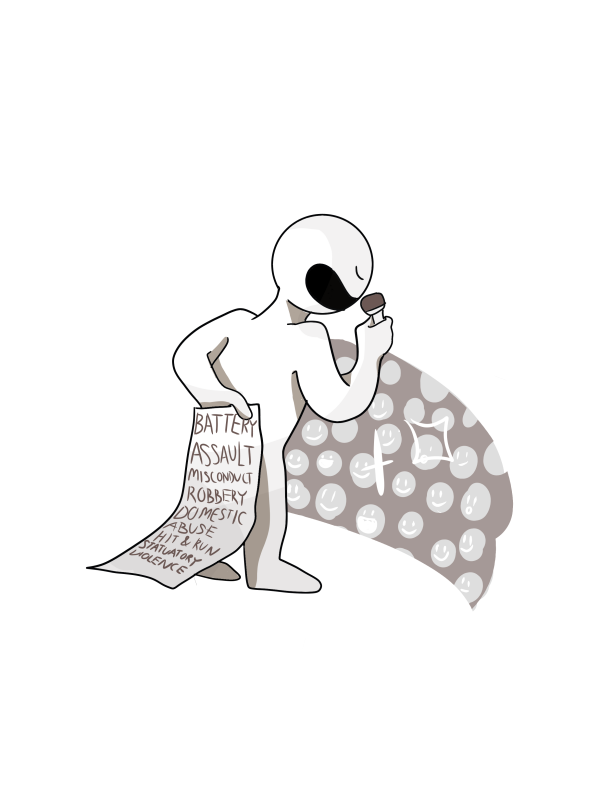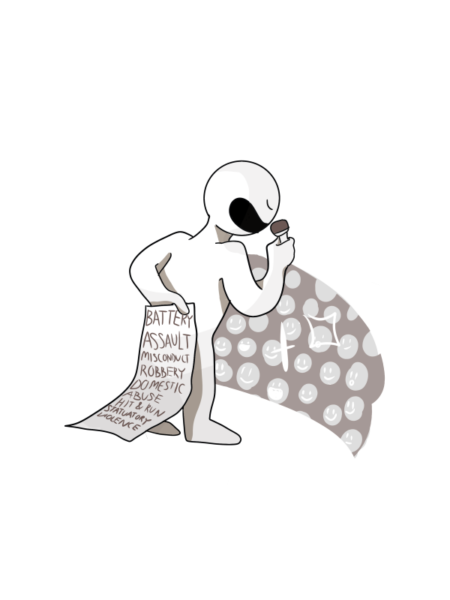

Music — the words resonate within one’s skull and its vibes enchant listeners. It’s a means of expression and therapy, located at the heart of popular culture. Often music is an escape, something we don’t think twice about.
However, when the voice behind the song belongs to someone who has committed a crime, how does our culture respond?
While their image may be tarnished, their album sales certainly aren’t. According to The New York Times, now-deceased hip-hop artist XXXTentacion’s song “Look At Me” rose to the top of charts in 2017, despite his recent imprisonment for a case of aggravated battery and the reports that surfaced of him abusing his pregnant girlfriend. More recently, the documentary series “Surviving R. Kelly” premiered, featuring survivors of R. Kelly’s sexual abuse detailing their allegations against him. Yet the day after the documentary premiered, his streaming numbers surged, according to Billboard.
“It doesn’t mean I’m completely supporting a crime they committed or something they did wrong”
Recently, the music industry has faced controversy in regards to “problematic” artists and has attempted to address this by removing artists from their streaming platforms like Spotify initially planned to do with R. Kelly and XXXTentacion, but cancelled after significant backlash. But should this epithet determine whether or not we listen to their music?
Sophomore Nathan Hom, a fan of XXXTentacion, thinks it should not.
“Lyrics are very important to follow, and some artists use lyrics to describe what’s going on in their life,” Hom said. “I don’t think it should impact how people should or shouldn’t listen to [the artist’s] songs just because they did something wrong.”
“[By] listening to their music, it can directly support them [financially] … but it doesn’t mean I’m completely supporting a crime they committed or something they did wrong,” Hom said. “It means I’m supporting their career, not their life outside their career.”
In contrast, senior Padina Amirnasiri believes there are harmful consequences in listening to problematic artists — it normalizes their behavior and sends a message to survivors of abuse.
“[It] could set an example where people think that it’s excusable to do such heinous things that you would completely judge someone for in an everyday situation,” Amirnasiri said.
Furthermore, Amirnasiri believes that streaming problematic, specifically abusive, artists can be harmful to their victims.
“[It] must be really painful for them to … have to see that somebody who is an abuser is on top and [not getting] reprimanded for those actions,” she said.
Nonetheless, some listeners believe music can be separated from an artist’s history.
“It really depends on what they do, but I feel like music is just music,” said sophomore Amy Wang. “Your past doesn’t matter in the quality of the music, [as] it wouldn’t affect it.”
Freshman Dylan Hansen shares similar views.
“Yes, [their crimes] change my perception of them as a person, [but] not necessarily of their music,” Hansen said. “If they write music again, I may still listen to it.”
However, Amirnasiri disagrees with this viewpoint and believes that listening to a problematic artist has larger consequences.
“By ignoring [the problematic history,] you’re ignoring a larger issue at hand. You’re making a space where it’s acceptable for these people to do such bad things and stay on top, and that sets a really bad message for our society,” Amirnasiri said.
In contrast, freshman Sara Killoran continues listening to Melanie Martinez’s music after viewing the allegations of molestation against Martinez because she separates Martinez as an artist and a person.
“I usually focus on the positive [and] listen to her music just because it’s good music,” Killoran said. “I don’t really think of her as a person.”
At the end of the day, the choice is — quite literally — in our hands.




